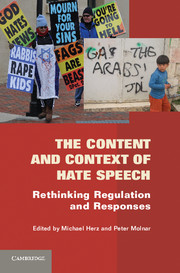Book contents
- Frontmatter
- Contents
- Contributors
- Foreword: Hate Speech and the Coming Death of the International Standard before It Was Born (Complaints of a Watchdog)
- Foreword: Hate Speech and Common Sense
- Acknowledgments
- Introduction
- Part I Overviews
- Part II Refinements and Distinctions
- Part III Equality and Fear
- Part IV International Law
- 22 Does International Law Provide for Consistent Rules on Hate Speech?
- 23 State-Sanctioned Incitement to Genocide
- 24 A Survey and Critical Analysis of Council of Europe Strategies for Countering “Hate Speech”
- 25 The American Convention on Human Rights
- 26 Orbiting Hate? Satellite Transponders and Free Expression
- Index
- References
24 - A Survey and Critical Analysis of Council of Europe Strategies for Countering “Hate Speech”
Published online by Cambridge University Press: 05 June 2012
- Frontmatter
- Contents
- Contributors
- Foreword: Hate Speech and the Coming Death of the International Standard before It Was Born (Complaints of a Watchdog)
- Foreword: Hate Speech and Common Sense
- Acknowledgments
- Introduction
- Part I Overviews
- Part II Refinements and Distinctions
- Part III Equality and Fear
- Part IV International Law
- 22 Does International Law Provide for Consistent Rules on Hate Speech?
- 23 State-Sanctioned Incitement to Genocide
- 24 A Survey and Critical Analysis of Council of Europe Strategies for Countering “Hate Speech”
- 25 The American Convention on Human Rights
- 26 Orbiting Hate? Satellite Transponders and Free Expression
- Index
- References
Summary
Introduction
The Council of Europe is a regional intergovernmental organization committed to ensuring respect for human rights, democracy, and the rule of law throughout Europe. Its current membership is forty-seven states. Its primary aim, as set out in its statute, is to “achieve a greater unity between its members for the purpose of safeguarding and realizing the ideals and principles which are their common heritage and facilitating their economic and social progress.” It pursues this aim “through the organs of the Council by discussion of questions of common concern and by agreements and common action in economic, social, cultural, scientific, legal and administrative matters and in the maintenance and further realization of human rights and fundamental freedoms.”
The Council employs a number of concurrent strategies to counter “hate speech.” These strategies have been developed pursuant to the Council's various treaties and other standard-setting and monitoring initiatives. While they are broadly congruent in terms of their overall objectives and approaches, each initiative is characterized by its own priorities, emphases, and procedural possibilities. This has resulted in considerable diversity in the range of strategies devised by the Council to combat “hate speech.” They include: the denial or reduction of legal protection for “hate speech”; the facilitation and creation of expressive opportunities (especially access to the media) for minorities; and the promotion of intercultural dialogue and understanding at the societal level.
- Type
- Chapter
- Information
- The Content and Context of Hate SpeechRethinking Regulation and Responses, pp. 456 - 498Publisher: Cambridge University PressPrint publication year: 2012
References
- 8
- Cited by



